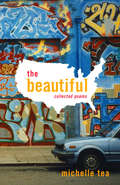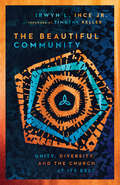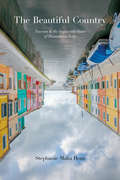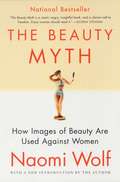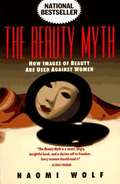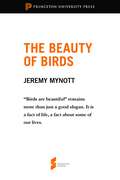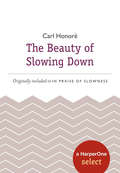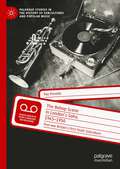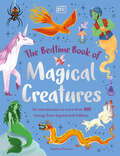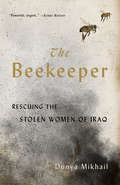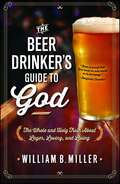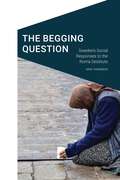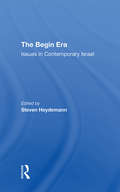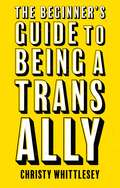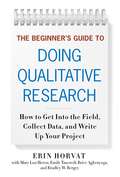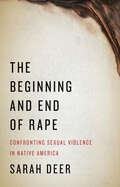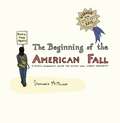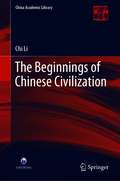- Table View
- List View
The Beautiful
by Michelle TeaBefore she wrote prose, Michelle Tea was a poet. This expansive, fiery volume collects Tea's early chapbooks along with previously unpublished poems, making vivid Tea's own life, from the dysfunctional family household she left in New England through college and the Tucson sex trade, to the happier life she made for herself on the West Coast.
The Beautiful Community: Unity, Diversity, and the Church at Its Best
by Irwyn L. Ince Jr.The church is at its best when it pursues the biblical value of unity in diversity. Our world has been torn asunder by racial, ethnic, and ideological differences. It is seen in our politics, felt in our families, and ingrained in our theology. Sadly, the church has often reinforced these ethnic and racial divides. To cast off the ugliness of disunity and heal our fractured humanity, we must cultivate spiritual practices that help us pursue beautiful community. In The Beautiful Community, pastor and theologian Irwyn Ince boldly unpacks the reasons for our divisions while gently guiding us toward our true hope for wholeness and reconciliation. God reveals himself to us in his trinitarian life as the perfection of beauty, and essential to this beauty is his work as Father, Son, and Holy Spirit. The gospel imperative to pursue the beautiful community—unity in diversity across lines of difference—is rooted in reflecting the beautiful community of our triune God. This book calls us into and provides tools for that pursuit.
The Beautiful Country: Tourism and the Impossible State of Destination Italy
by Stephanie Malia HomEvery year, Italy swells with millions of tourists who infuse the economy with billions of dollars and almost outnumber Italians themselves. In fact, Italy has been a model tourist destination for longer than it has been a modern state. The Beautiful Country explores the enduring popularity of “destination Italy,” and its role in the development of the global mass tourism industry. Stephanie Malia Hom tracks the evolution of this particular touristic imaginary through texts, practices, and spaces, beginning with the guidebooks that frame Italy as an idealized land of leisure and finishing with destination Italy’s replication around the world. Today, more tourists encounter Italy through places like Las Vegas’s The Venetian Hotel and Casino or Dubai’s Mercato shopping mall than experience the country in Italy itself. Using an interdisciplinary methodology that includes archival research, ethnographic fieldwork, literary criticism, and spatial analysis, The Beautiful Country reveals destination Italy’s paramount role in the creation of modern mass tourism.
The Beautiful Fall: Fashion, Genius, and Glorious Excess in 1970s Paris
by Alicia Drake"Deliciously dramatic... The Beautiful Fall crackles with excitement."-New York Times Book Review In the 1970s, Paris fashion exploded like a champagne bottle left out in the sun. Amid sequins and longing, celebrities and aspirants flocked to the heart of chic, and Paris became a hothouse of revelry, intrigue, and searing ambition. At the center of it all were fashion's most beloved luminaries - Yves Saint Laurent, the reclusiveenfant terrible,and Karl Lagerfeld, the flamboyant freelancer with a talent for reinvention - and they divided Paris into two fabulous halves. Their enduring rivalry is chronicled in this dazzling exposé of an era: of social ambitions, shared obsessions, and the mesmerizing quest for beauty. "Fascinating." - New York Times "Addictive." - Philadelphia Inquirer "It's like US Weekly, 1970s style." - Gotham "A story constructed as exquisitely as a couture dress. . . . It moves stylishly forward, with frequent over-the-shoulder glances at some very dishy background." - Boston Globe
The Beauty Industry: Gender, Culture, Pleasure
by Paula BlackThe beauty industry is now a multinational, multi-million dollar business. In recent years its place in contemporary culture has altered hugely as salons have become not simply places to have your hair cut or your nails done, but increasingly sites of physical and even spiritual therapy. In this fascinating and nuanced study, Paula Black strips away many popular assumptions about the beauty industry, including the one that says it exploits people's insecurity by projecting an illusory beauty myth. The interviews in this book - both with the beauty industry's workers and its clients - reveal a far more complex and interesting picture, and, in their presentation, Black re-formulates many feminist debates around choice and constraint. The debates addressed include issues around the body; the construction and maintenance of gender identity; changing definitions of health and well-being; and labour processes.
The Beauty Myth
by Naomi Wolf<P>The bestselling classic that redefined our view of the relationship between beauty and female identity. <P>In today's world, women have more power, legal recognition, and professional success than ever before. <P>Alongside the evident progress of the women's movement, however, writer and journalist Naomi Wolf is troubled by a different kind of social control, which, she argues, may prove just as restrictive as the traditional image of homemaker and wife. <P>It's the beauty myth, an obsession with physical perfection that traps the modern woman in an endless spiral of hope, self-consciousness, and self-hatred as she tries to fulfill society's impossible definition of "the flawless beauty."
The Beauty Myth: How Images of Beauty Are Used Against Women
by Naomi WolfExplores the phenomenon of the violent backlash against feminism that uses images of female beauty as a political weapon against women's advancement.
The Beauty Suit: How My Year of Religious Modesty Made Me a Better Feminist
by Lauren ShieldsA young feminist finds herself questioning why "hotness" has become necessary for female empowerment--and looks for alternatives.Looking good feels good. But in a society where looking good is posited as being strong, while negotiating for better pay is statistically proven to damage our careers, is it fair to say that wicked eyeliner, weekly blowouts, and a polished Instagram feed are the keys to our liberation? If so--if "hot" really is a good enough synonym for "empowered"--why do so many of us feel, deep in our bones, that the sexy-as-strong model is a distraction? Is "pretty" still the closest to power women can get? Why is looking fierce an acceptable substitute for living in a world where women are safe?Inspired in seminary by American Muslimahs who wear the hijab for feminist reasons, Lauren Shields took off what she calls the Beauty Suit--the "done" hair, the tasteful and carefully applied makeup, the tight clothes and foot-binding shoes--for nine months. She'd really only wanted to do an experiment. Instead, her life--especially her views on what constitutes "liberation"--changed forever.Rooted in feminist theory and religious history, and guided by a snappy personal narrative, The Beauty Suit unpacks modern American womanhood: a landscape where the female body is still so often the battleground for male ideals, and where we struggle with our rights as human beings to define and exercise our freedom.
The Beauty of Birds: From Birdscapes: Birds in Our Imagination and Experience (Princeton Shorts #10)
by Jeremy MynottSpring returns and with it the birds. But it also brings throngs of birders who emerge, binoculars in hand, to catch a glimpse of a rare or previously unseen species or to simply lay eyes on a particularly fine specimen of a familiar type. In a delightful meditation that unexpectedly ranges from the Volga Delta to Central Park and from Charles Dickens's Hard Times to a 1940s London burlesque show, Jeremy Mynott ponders what makes birds so beautiful and alluring to so many people. Princeton Shorts are brief selections taken from influential Princeton University Press books and produced exclusively in ebook format. Providing unmatched insight into important contemporary issues or timeless passages from classic works of the past, Princeton Shorts enable you to be an instant expert in a world where information is everywhere but quality is at a premium.
The Beauty of Slowing Down
by Carl HonoreThis selection from award-winning journalist Carl Honore's In Praise of Slowness introduces us to people all over the world who are reclaiming their time and slowing down the pace-and living happier, more productive, and healthier lives as a result. A slow revolution is taking place. This is a modern revolution, championed by cell-phone using, emailing lovers of sanity. The slow philosophy can be summed up in a single word: balance. People are discovering energy and efficiency where you may have least expected-in slowing down. In The Beauty of Slowing Down rehabilitated speedaholic Carl Honore presents an engaging and entertaining exploration of a movement whose moment has finally come.
The Bebop Scene in London's Soho, 1945-1950: Post-war Britain’s First Youth Subculture (Palgrave Studies in the History of Subcultures and Popular Music)
by Ray KinsellaThis is the first book to tell the story of the bebop subculture in London’s Soho, a subculture that emerged in 1945 and reached its pinnacle in 1950. In an exploration via the intersections of race, class and gender, it shows how bebop identities were constructed and articulated. Combining a wide range of archival research and theory, the book evocatively demonstrates how the scene evolved in Soho’s clubs, the fashion that formed around the music, drug usage amongst a contingent of the group, and the moral panic which led to the police raids on the clubs between 1947 and 1950. Thereafter it maps the changes in popular culture in Soho during the 1950s, and argues that the bebop story is an important precedent to the institutional harassment of black-related spaces and culture that continued in the twentieth and twenty-first centuries. This book therefore rewrites the first chapter of the ‘classic’ subcultural canon, and resets the subcultural clock; requiring us to rethink the periodization and social make-up of British post-war youth subcultures.
The Bedtime Book of Magical Creatures: An Introduction to More than 100 Creatures from Legend and Folklore (The Bedtime Books)
by Stephen KrenskySay hello to more than 100 of your favorite magical creatures with this delightful, illustrated introduction.This is the must-have bedtime book about the world's most fantastical creatures from around the world. Turn each page to find out more about the amazing variety of magical creatures—from fairies and mermaids to dragons and unicorns.With charming illustrations, storybook text, and key terms highlighted on each page, this book is a wonderful and comprehensive introduction to magical creatures. The book showcases beings from land, water, and air, in three comprehensive chapters. Many pages are devoted to a particular creature, with others featuring a collection of similar beings, such as witches and genies, giving bite-sized chunks of accessible information to help early learners get to know more about their favourite creature from myths, legends, and story books. There are also reference pages at the end of the book that give more information on the context and origins of each creature.A timeless gift book, The Bedtime Book of Magical Creatures will be treasured for years to come.
The Beebo Brinker Omnibus: Ann Bannon's Pulp Classics
by Ann BannonDesignated the "queen of lesbian pulp fiction" for authoring five landmark novels, Ann Bannon's work defined lesbian fiction for the pre-Stonewall generation. Unlike many writers of the period, however, Bannon broke through the shame and isolation typically portrayed in lesbian pulps, offering instead women characters who embrace their sexuality against great odds. With Beebo Brinker, Bannon introduces the title character, a butch 17-year-old farm girl newly arrived in New York after she is driven from her Wisconsin home town for wearing drag to the State Fair. Befriended by the gay Jack Mann, a father figure with a weakness for runaways, Beebo sets out to find love. She never knew what she wanted -- until she came to Greenwich Village and found the love that smolders in the shadows of the twilight world. The 880-page Beebo Brinker Omnibus includes the novels Beebo Brinker, I Am a Woman, Journey to a Woman, Odd Girl Out, and Women in the Shadows. Sexy, dangerous, and often touching, the paperbacks sold millions. Chronicling the reality of 1950s lesbian life, Beebo Brinker is an astounding and engaging read.
The Beecher Sisters
by Barbara Anne WhiteThe Beecher sisters--Catharine, Harriet, and Isabell A&M were three of the most prominent women in nineteenth-century America. Daughters of the famous evangelist Lyman Beecher, they could not follow their father and seven brothers into the ministry. Nonetheless, they carved out pathbreaking careers for themselves. Catharine Beecher founded the Hartford Female Seminary and devoted her life to improving women's education. Harriet Beecher Stowe became world famous as the author of Uncle Tom's Cabin. Isabella Beecher Hooker was an outspoken advocate for women's rights. This engrossing book is a joint biography of the sisters, whose lives spanned the full course of the nineteenth century. The life of Isabella Beecher--who has never been the subject of a biography--is examined in particular detail here. Drawing on little used sources, Barbara White explores Isabella's political development and her interactions with her sisters and with prominent people of the time--from Susan B. Anthony and Elizabeth Cady Stanton,to Mark Twain.
The Beekeeper: Saving The Stolen Women Of Iraq
by Max Weiss Dunya Mikhail<P>The true story of a beekeeper who risks his life to rescue enslaved women from Daesh <P>Since 2014, Daesh (ISIS) has been brutalizing the Yazidi people of northern Iraq: sowing destruction, killing those who won’t convert to Islam, and enslaving young girls and women. <P>The Beekeeper, by the acclaimed poet and journalist Dunya Mikhail, tells the harrowing stories of several women who managed to escape the clutches of Daesh. <P>Mikhail extensively interviews these women—who’ve lost their families and loved ones, who’ve been sexually abused, psychologically tortured, and forced to manufacture chemical weapons—and as their tales unfold, an unlikely hero emerges: a beekeeper, who uses his knowledge of the local terrain, along with a wide network of transporters, helpers, and former cigarette smugglers, to bring these women, one by one, through the war-torn landscapes of Iraq, Syria, and Turkey, back into safety. <P>In the face of inhuman suffering, this powerful work of nonfiction offers a counterpoint to Daesh’s genocidal extremism: hope, as ordinary people risk their own lives to save those of others.
The Beer Drinker's Guide to God
by William B. MillerIt's no accident that Jesus' first miracle was turning water into wine! Written by an Episcopalian priest-slash-bar owner, this thoughtful, well-written book of spiritual essays distills lessons about the character of God from stories about adult beverages."Oh taste and see that the Lord is good." --Psalm 34:8 Being upright does not mean you have to be uptight--at least according to Father Bill Miller, an Episcopal priest/bar owner. As a fan of both spirits and the Holy Spirit, he is very familiar with the intoxicating lure of some of God's finer creations, and in The Beer Drinker's Guide to God he brews up insightful, beautifully written reflections about the strange intersections of God, and, well...beer. In this humorous collection of essays, he weaves together stories from his life in ministry, his travels in search of the world's best Scotch, his conversations with Trappist monks, and colorful evenings in his bar, Padre's. He also reflects on the lessons he's learned from baseball, Playboy bunnies, Las Vegas, and his attempts to become chaplain to the Dallas Cowboy cheerleaders, all while (somehow) crafting essays about the spiritual importance of generosity, sacrifice, openness, and spiritual transformation. Really. Essays include: · WWJD: What Would Jesus Drink?· Brewed Over Me and Distill Me, O Lord· Pearls of Great Price· Chicken Soup for the Hooters Girl's Soul· Miss Hawaii and Other Miss Takes· Don't Leave me Hanging: The Theological Significance of Athletic Supporters From the deeply touching to the laugh-out-loud funny, these stories ultimately open our minds to the glory of God and our mouths to some of God's more delicious creations. The Beer Drinker's Guide to God is a smart, hilarious book for those thirsty for God's truth.
The Beggar Lama: The Life of the Gyalrong Kuzhap
by Jinba TenzinThe Beggar Lama is the story of the Gyalrong Kuzhap, a Tibetan Buddhist polymath and reincarnated lama who has led a remarkable life through the vicissitudes of the twentieth century. Born in 1930 in Tsanlha, Gyalrong, on the easternmost fringes of the Himalayan-Tibetan Plateau, he would go on to become a monk, a Communist official, a professor of Tibetan studies, and a leader in the Tibetan cultural survival movement in China.Drawing on hundreds of hours of in-depth and open-ended conversations over more than a decade, Tenzin Jinba presents the Gyalrong Kuzhap’s life story. The Beggar Lama chronicles his journeys—from Gyalrong to Lhasa, from steadfast Communist to critic of the Chinese regime, from scholar to activist—painting a compelling portrait of an influential and unconventional figure. In so doing, the book shows how the Gyalrong Kuzhap’s tale intertwines with larger social and political developments, providing a wide-ranging history of Tibet, the Sino-Tibetan borderlands, and China over the past century.The Beggar Lama shares the Gyalrong Kuzhap’s insightful and often critical views on Tibetan cultural and religious institutions, the Chinese Communist Party’s social and political agendas, Tibetan studies in China, and the prospects for Tibetan cultural rebirth. Above all, it is a story of hope in dark times, as the Gyalrong Kuzhap seeks with his “last breath” to prevent Tibetan culture and memory from vanishing.
The Begging Question: Sweden's Social Responses to the Roma Destitute (Cultural Geographies + Rewriting the Earth)
by Erik HanssonBegging, thought to be an inherently un-Swedish phenomenon, became a national fixture in the 2010s as homeless Romanian and Bulgarian Roma EU citizens arrived in Sweden seeking economic opportunity. People without shelter were forced to use public spaces as their private space, disturbing aesthetic and normative orders, creating anxiety among Swedish subjects and resulting in hate crimes and everyday racism. Parallel with Europe&’s refugee crisis in the 2010s, the &“begging question&” peaked. The presence of the media&’s so-called EU migrants caused a crisis in Swedish society along political, juridical, moral, and social lines due to the contradiction embodied in the Swedish authorities&’ denial of social support to them while simultaneously seeking to maintain the nation&’s image as promoting welfare, equality, and antiracism. In The Begging Question Erik Hansson argues that the material configurations of capitalism and class society are not only racialized but also unconsciously invested with collective anxieties and desires. By focusing on Swedish society&’s response to the begging question, Hansson provides insight into the dialectics of racism. He shrewdly deploys Marxian economics and Lacanian psychoanalysis to explain how it became possible to do what once was thought impossible: criminalize begging and make fascism politically mainstream, in Sweden. What Hansson reveals is not just an insight into one of the most captivating countries on earth but also a timely glimpse into what it means to be human.
The Begin Era: Issues In Contemporary Israel
by Steven Heydemann Jean NewsomThe years of Menachem Begin's leadership were among the most turbulent in Israeli history. Domestically, the preeminence of the Labor Alignment was successfully challenged, the Likud government failed to reduce Israel's high inflation rate, military and security expenditures reached new highs, and the politicization of economic policy increased. Internationally, although Israel's policy toward the occupied territories and its regional strategy were the focus of domestic and international debate, Begin's policies--departures from earlier norms--did successfully define Israel's foreign policy agenda, and his outlook is likely to continue to influence policy considerations. The contributors to this volume explore how Israel changed under Begin, the source of those changes, and how Israel is likely to evolve in a post-Begin era.
The Beginner's Guide to Being A Trans Ally
by Christy WhittleseyWhat does cisgender mean? What are people saying when they refer to "assigned" gender? Why is it not OK to say 'preferred pronouns'? What is cis privilege? If you're curious about the answers to these questions and want to learn more, this book is for you.This easy-to-read guide offers information and advice to anyone wanting to understand more about trans experiences. It explains what gender identity is and arms you with the correct terminology to use. Filled with real-life examples and FAQs, it offers helpful strategies to navigate respectful conversations, speak up against transphobia and create inclusive relationships and spaces. It's the ideal tool for anyone wanting to become a better ally to transgender and/or nonbinary people.
The Beginner's Guide to Doing Qualitative Research
by Erin Horvat Mary Lou Heron Emily Tancredi-Brice Agbenyega Bradley W. BergeyDesigned for aspiring ethnographers and qualitative researchers, this book is organized into three parts that addresses the key phases of any ethnographic project: beginning a project, collecting data in the field, and analysing data and writing about your study.
The Beginning and End of Rape: Confronting Sexual Violence in Native America
by Sarah DeerWinner of the Labriola Center American Indian National Book Award Despite what major media sources say, violence against Native women is not an epidemic. An epidemic is biological and blameless. Violence against Native women is historical and political, bounded by oppression and colonial violence. This book, like all of Sarah Deer&’s work, is aimed at engaging the problem head-on—and ending it.The Beginning and End of Rape collects and expands the powerful writings in which Deer, who played a crucial role in the reauthorization of the Violence Against Women Act in 2013, has advocated for cultural and legal reforms to protect Native women from endemic sexual violence and abuse. Deer provides a clear historical overview of rape and sex trafficking in North America, paying particular attention to the gendered legacy of colonialism in tribal nations—a truth largely overlooked or minimized by Native and non-Native observers. She faces this legacy directly, articulating strategies for Native communities and tribal nations seeking redress. In a damning critique of federal law that has accommodated rape by destroying tribal legal systems, she describes how tribal self-determination efforts of the twenty-first century can be leveraged to eradicate violence against women. Her work bridges the gap between Indian law and feminist thinking by explaining how intersectional approaches are vital to addressing the rape of Native women.Grounded in historical, cultural, and legal realities, both Native and non-Native, these essays point to the possibility of actual and positive change in a world where Native women are systematically undervalued, left unprotected, and hurt. Deer draws on her extensive experiences in advocacy and activism to present specific, practical recommendations and plans of action for making the world safer for all.
The Beginning of the American Fall: A Comics Journalist Inside the Occupy Wall Street Movement
by Stephanie McmillanCan a cartoonist and millions of random strangers change the world? The initial stages of their attempt are chronicled in this book of comics-journalism and written observations. Stephanie McMillan, long-time activist and cartoonist, has waited her entire life for the American people to rise up. Sparked by uprisings around the world, a new movement bursts onto the national scene against a system that denies the people a decent life and puts the planet at risk. With delightful full-color drawings, interviews, dialogue, description, and insightful reflections, this book chronicles the first several months of the fragile and contradictory movement. It situates detailed personal experiences and representative narratives within the broad context of a truly unique and historical global conjuncture. This book will stand as a record of the emerging movement in accessible comics form.
The Beginnings of Chinese Civilization (China Academic Library)
by Chi LiThis book presents a collection of archaeological and anthropological writings by Li Chi, the founding father of modern archaeology in China. It is divided into two parts, the first of which traces back the rise of Chinese civilization, as well as the origins of the Chinese people; in turn, the second part reviews the rise of archaeology in China as a scientific subject that combines fieldwork methods from the West with traditional antiquarian studies. Readers who are interested in Chinese civilization will find fascinating information on the excavations of Yin Hsü (the ruins of the Yin Dynasty), including building foundations, bronzes, chariots, pottery, stone and jade, and thousands of oracle bones, which are vividly shown in historical pictures. These findings transformed the Yin Shang culture from legend into history and thus moved China’s history forward by hundreds of years, shocking the world. In turn, the articles on anthropology include Li Chi’s reflections on central problems in Chinese anthropology and are both enlightening and thought-provoking.
The Beginnings of Mesoamerican Civilization: Inter-regional Interaction and the Olmec
by Robert M. RosenswigMesoamerica is one of a several cradles of civilization in the world. In this book, Robert M. Rosenswig proposes that we understand Early Formative Mesoamerica as an archipelago of complex societies that interacted with one another over long distances and that were separated by less sedentary peoples. These early "islands" of culture shared an Olmec artistic aesthetic, beginning approximately 1250 BCE (uncalibrated), that first defined Mesoamerica as a culture area. Rosenswig frames the Olmec world from the perspective of the Soconusco area on Pacifica Chiapas and Guatemala. The disagreements about Early Formative society that have raged over the past 30 years focus on the nature of inter-regional interaction between San Lorenzo and other Early Formative regions. He evaluates these debates from a fresh theoretical perspective and integrates new data into an assessment of Soconusco society before, during, and after the apogee of the San Lorenzo polity.
